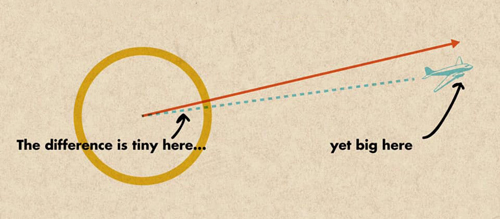
Too often people overestimate the significance of one big defining moment and underestimate the value of making good decisions and small steps of progress on a daily basis.
You’re probably familiar with what’s known as the Serenity Prayer. It goes like this:
God, grant me the serenity to accept the things I cannot change, the courage to change the things I can, and the wisdom to know the difference.
There’s an important lesson here — one that’s very often glossed over…
When a chaotic reality is swirling around us, we often try to relieve our anxiety by exerting our will over external things we cannot control.
It helps us stave off one of the most dreaded feelings: complete powerlessness.
With that in mind, I have good news and bad news.
The bad news is that generally speaking, almost everything is outside your control. What other people do, whether it will rain tomorrow, whether or not your efforts will be appreciated — all of these outcomes depend on factors that aren’t YOU.
But that’s also the good news.
The friction and frustration created by trying to change things you cannot change is the crucible where a ton of unhappiness is born. Accepting that most things are outside your influence gives you explicit permission to let them unfold as they may.
Stoic philosopher Epictetus put it this way:
“Some things are in our control and others not. Things in our control are opinion, pursuit, desire, aversion, and, in a word, whatever are our own actions. Things not in our control are body, property, reputation, command, and, in one word, whatever are not our actions.”
Overcoming the “three big un’s” that so many of us struggle with daily — unhappiness, unconvinced things will ever change, unsure what to do next — begins with understanding what you can control and what you cannot.
The mental shift here is not easy. Most of us have spent a lifetime worrying about things that we can’t control. Society practically encourages this. For most, it’s a bona fide habit — one that should be replaced with a healthy understanding of how much we can actually change. Again though, it’s hard to get your mind wrapped around all this when you’re constantly hearing…
“Why don’t you just get over it?” or “Just let it go.”
We’ve all heard some flavor of this advice before. And it passes the sniff test, to a certain extent.
I mean, “time heals all wounds,” right? Well, yes… sort of. But wounds heal differently depending on how they’re treated.
Left alone, a gash in your skin will leave a large scar and be vulnerable to injury again in the future. This is why we get stitches — it helps the wound heal in a way that limits the chance of re-injury down the road.
Emotional wounds work the same way. Given enough time, most emotional pain will diminish — that’s true. But…
Just “Getting Over It” Leaves Scars
In the emotional sense, scars equal baggage — baggage we carry with us into every aspect of our lives. These scars grow and accumulate until one day you wake up suffering from one or more of the “three un’s” (unhappiness, unconvinced things will ever change, unsure what to do next).
So, don’t get over it. Go through it, one step at a time.
Honestly, I understand the desire to “get over” difficult experiences or situations rather than facing them. Revisiting painful memories or facing our present demons is really, really hard. And we as human beings are hard-wired to not cause ourselves pain.
However, as our parents taught us, ignoring a problem doesn’t make it go away.
And in addition to the scars, to ignore or downplay a wound puts you at risk for infection, emotionally as well as physically.
Unresolved issues in your life take up residence in your mind and influence your decisions, your relationships, and your attitudes. They rob you of your happiness and potential.
Of course, doing the hard yet necessary things to resolve your issues and heal your wounds can feel impossible. This is how Marc and I felt a decade ago when we were knocked down and stuck in a rut after simultaneously losing two loved ones — including my dear brother — to self-harm and illness. It was nearly impossible to move anywhere significant when we didn’t feel we had the strength to push forward.
So if you’re feeling this way now — like it’s impossible to make significant progress today — you aren’t wrong for feeling what you feel. In many cases, you’re right: significant progress comes gradually with time and consistency. It’s all about taking one tiny positive step at a time, and staying the course.
Consider the following section, which is an excerpt from “The Good Morning Journal”:
The Power of Tiny Changes
Think about the fact that it only takes a one degree change in temperature to convert water to vapor, or ice to water. It’s such a tiny change — just one step in a different direction — and yet the results are dramatic. A tiny change can make all the difference in the world.
Now consider another example where a tiny change is compounded by time and distance. Perhaps you’re trying to travel somewhere specific, but you’re off course by just one tiny degree in the wrong direction…
- After one mile, you would be off course by over 92 feet.
- If you were trying to travel from San Francisco to Washington, D.C., you would land near Baltimore, Maryland, over 42 miles away from your desired destination.
- Traveling around the world from Washington, D.C. back to Washington D.C., you’d miss by 435 miles and end up landing near Boston instead.
- In a spaceship traveling to the moon, a one-degree error would have you missing the moon by over 4,100 miles.
You get the idea — over time and distance, a mere one-degree change in course makes a significant difference…

This same philosophy holds true in various aspects of our lives. The tiniest and most fundamental things we do each day — positive and negative alike — can make all the difference. They either bring us closer or farther away from where we ultimately want to be. And yet, we mostly ignore this reality. We default to behaving as if our daily actions won’t ever be significant enough. Or, again, we try to exert control over the bigger things we have no control over.
Think about it…
- How many people uphold unhealthy and unproductive habits?
- How many people wait around and procrastinate on the next positive step?
- How many people live every day of their lives moving one degree away from where they ultimately want to be?
Don’t be one of them!
Truth be told, everyone travels 24 hours a day whether they’re moving in the right direction or not.
How much richer would your life be if you committed yourself to making just one degree of effort toward improving something about your situation each day?
And even though it will surely be harder than doing nothing, it doesn’t even have to be anything that hard. You just need to muster up the courage to break free from the status quo and take one small, fundamental step forward today, and then do it again tomorrow.
Pick something tiny and productive to improve upon, and then make it a daily habit.
Doing so will make all the difference in the world — it could literally change your life — just a few short weeks down the road.
Now it’s your turn…
Yes, it’s your turn to focus on those fundamental yet life-changing steps today. So give yourself some credit right now for how far you’ve come, and then take the next step forward.
But before you go, please leave Marc and me a comment below and let us know what you think of this essay. Your feedback is important to us. 🙂
Also, if you haven’t done so already, be sure to sign-up for our free newsletter to receive new articles like this in your inbox each week.








4pazpj
8hy2e2
1afnxo
8thz95
iuwtpb
sg3ogc
g6xv4q
by6xsb
j924om
Regardless of the rise of digital timepieces, classic wristwatches are still iconic.
Collectors and watch lovers admire the intricate design that goes into mechanical watches.
Compared to modern wearables, that become outdated, mechanical watches stay relevant for decades.
http://support.tuyaoem.com/threads/6007/
High-end manufacturers are always introducing exclusive mechanical models, proving that their appeal is as high as ever.
To a lot of people, an automatic timepiece is not just an accessory, but a tribute to timeless elegance.
Even as high-tech wearables offer convenience, mechanical watches represent an art form that remains unmatched.
На этом сайте вы можете наслаждаться широким ассортиментом слотов.
Игровые автоматы характеризуются красочной графикой и интерактивным игровым процессом.
Каждая игра даёт особые бонусные возможности, улучшающие шансы на успех.
Mostbet
Игра в игровые автоматы предназначена игроков всех уровней.
Вы можете играть бесплатно, а затем перейти к игре на реальные деньги.
Проверьте свою удачу и получите удовольствие от яркого мира слотов.
На этом сайте вы можете испытать широким ассортиментом игровых автоматов.
Игровые автоматы характеризуются яркой графикой и захватывающим игровым процессом.
Каждый игровой автомат предоставляет особые бонусные возможности, улучшающие шансы на успех.
1xbet казино
Игра в игровые автоматы предназначена игроков всех уровней.
Вы можете играть бесплатно, после чего начать играть на реальные деньги.
Испытайте удачу и насладитесь неповторимой атмосферой игровых автоматов.
Suicide is a complex issue that touches millions of people worldwide.
It is often linked to mental health issues, such as bipolar disorder, hopelessness, or chemical dependency.
People who consider suicide may feel isolated and believe there’s no other way out.
how-to-kill-yourself.com
It is important to talk openly about this matter and help vulnerable individuals.
Mental health care can reduce the risk, and finding help is a brave first step.
If you or someone you know is struggling, don’t hesitate to get support.
You are not without options, and help is available.
На нашем портале вам предоставляется возможность испытать обширной коллекцией игровых слотов.
Эти слоты славятся яркой графикой и захватывающим игровым процессом.
Каждый слот предлагает особые бонусные возможности, улучшающие шансы на успех.
1xbet казино официальный сайт
Игра в игровые автоматы предназначена как новичков, так и опытных игроков.
Вы можете играть бесплатно, и потом испытать азарт игры на реальные ставки.
Испытайте удачу и насладитесь неповторимой атмосферой игровых автоматов.
На этом сайте вы можете испытать большим выбором игровых автоматов.
Слоты обладают живой визуализацией и увлекательным игровым процессом.
Каждая игра даёт уникальные бонусные раунды, увеличивающие шансы на выигрыш.
1win games
Игра в игровые автоматы предназначена как новичков, так и опытных игроков.
Есть возможность воспользоваться демо-режимом, а затем перейти к игре на реальные деньги.
Проверьте свою удачу и получите удовольствие от яркого мира слотов.